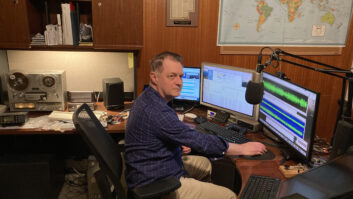
Spectrum analyzer display of amplitude modulated carrier at 1490 kHz A contract engineer operates his or her own business, and you are the president of your own company. A successful businessperson combines knowledge, professionalism and experience to realize profit. Clients will judge you based on your presentation, performance, knowledge and communication skills.
The knowledge and experience required to serve as a contract engineer have increased substantially over the years. Equipment may be more diverse, serving stations with varying budgets and technical needs.
A small AM station may still use a plate-modulated tube transmitter, satellite-delivered programming and digital automation system. The technologies in such an operation span almost a century.

Tester used to evaluate copper and fiber optic cables However, the test equipment and tools necessary to effectively maintain and troubleshoot broadcast gear have also diversified. In times past, a Simpson 260 VOM, pair of high-impedance headphones and an oscilloscope mostly satisfied the needs of daily troubleshooting. An audio oscillator and distortion meter were required to conduct audio proofs-of-performance. The FCC requirement for audio proofs is history, and test gear necessary to evaluate Cat-5/Cat-6 cable or network activity, perform FCC-required AM emissions measurements and set up satellite dishes properly is almost mandatory. This equipment represents a considerable capital investment.
CORE COMPETENCIES
In addition to the test gear required to service the various equipment encountered in today’s broadcast station, the knowledge and experience to use and interpret the results competently are key.
Vacuum tube and transistor technology is barely mentioned in today’s electronics technology curriculum, yet many stations still use them on a daily basis.
IT is an important core subject, and it is pertinent to satellite receivers, modern transmitters, audio consoles and distribution systems, telephone systems — in general, it affects most employees in a broadcast facility. We depend on the Internet for news, audio transport, traffic logs, EAS, email and facility control. It is essential to daily operations.

Power level display shown on spectrum analyzer Some engineers also have experience in specialty disciplines. These include, but are not limited to, digital studio design and maintenance, transmitter maintenance and repair, remote broadcast facilitation, audio/PA system setup and equipment rentals, multi-user tower site management, analog audio equipment and the various facets of information technology and network operation.
SUPPLEMENT YOUR SALARY
Diversifying your expertise can provide sources of additional income. You might negotiate a rate with state broadcasters associations to provide annual FCC required emissions measurements for AM stations and for FMs with recently changed facilities. This assumes that the engineer owns or rents a spectrum analyzer with appropriate specifications.
You can develop income by performing due diligence inspections; conducting equipment inventory for owners; managing tenants on station-owned towers; and renting out and installing remote broadcast equipment.

Spectrum display of LNB output at satellite dish Contract engineers also can explore possibilities outside their normal realm of broadcast facilities.
Some possibilities include audio/video equipment rental and setup for presentations at company meetings; equipment breakdown and inventory for repossession companies; telephone installation, setup and maintenance; and PA rental and setup for carnivals and fairs. Professional sound/video installation for commercial and private venues, houses of worship and small arenas such as skating rinks are non-traditional sources of revenue.
In broadcast work, noncommercial stations, such as those at educational institutions, usually have simpler needs and are diligent about paying invoices. Depending on your skills and experience, you may be able to integrate as a part-timer in their A/V or IT department.
Internet stations require technically skilled professionals, particularly in the IT space. At most, these streamers typically use audio mixer and playback equipment, like a turntable, CD player and microphone. Nonetheless, such operations can benefit from the experience of a broadcast engineer who is familiar with ergonomic studio setup, audio storage and processing.

Test equipment for troubleshooting and repairing broadcast gear Once you’ve crossed that bridge, the advice of an attorney and/or CPA is most valuable. If you incorporate, should you do so as an LLC or LLP? And what type(s) and amounts of insurance should you carry? Offering services to the general public may require state licensure and/or registration with your state tax collection agency. These are questions where getting professional advice is essential.
A contract engineer should not limit his or her practice but diversify, to take advantage of all available opportunities to maximize income.
Tom Osenkowsky is a radio engineering consultant in Brookfield, Conn., and a longtime RW contributor. He has been in the radio broadcast industry since 1975.
Comment on this or any story. Email[email protected]with Letter to the Editor in the subject field.












